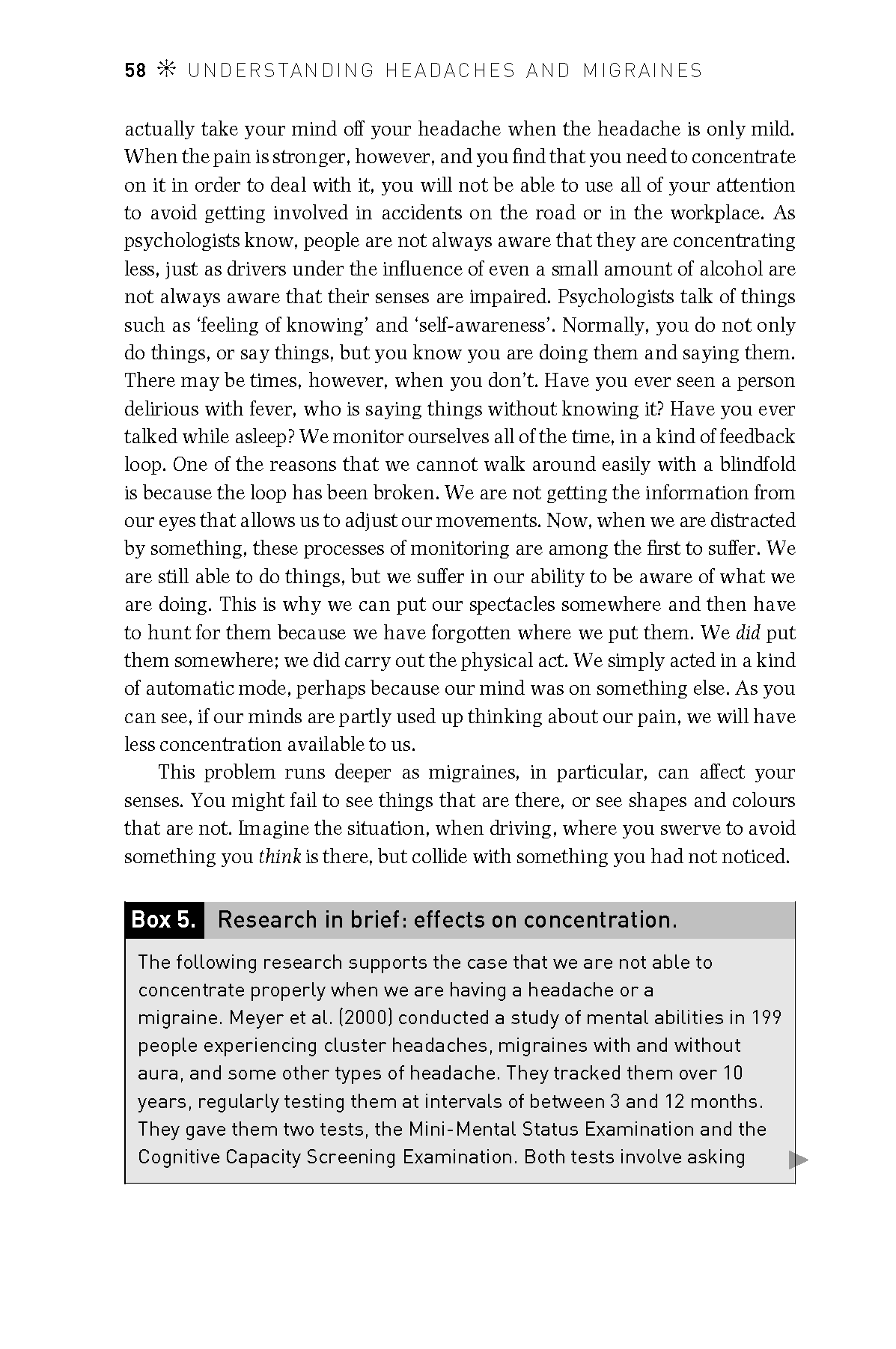UHAM075

58 * UNDERSTANDING HEADACHES AND M IG RAI N ES actually take your mind off your headache when the headache is only mild. When the pain is stronger, however, and you find that you need to concentrate on it in order to deal with it, you will not be able to use all of your attention to avoid getting involved in accidents on the road or in the workplace. As psychologists know, people are not always aware that they are concentrating less, just as drivers under the influence of even a smali amount of alcohol are not always aware that their senses are impaired. Psychologists talk of things such as ‘feeling of knowing’ and ‘self-awareness’. Normally, you do not only do things, or say things, but you know you are doing them and saying them. There may be times, however, when you don’t. Have you ever seen a person delirious with fever, who is saying things without knowing it? Have you ever talked while asleep? We monitor ourselves all of the time, in a kind of feedback loop. One of the reasons that we cannot walk around easily with a blindfold is because the loop has been broken. We are not getting the information from our eyes that allows us to adjust our movements. Now, when we are distracted by something, these processes of monitoring are among the first to suffer. We are still able to do things, but we suffer in our ability to be aware of what we are doing. This is why we can put our spectacles somewhere and then have to hunt for them because we have forgotten where we put them. We did put them somewhere; we did carry out the physical act. We simply acted in a kind of automatic modę, perhaps because our mind was on something else. As you can see, if our minds are partly used up thinking about our pain, we will have less concentration available to us.
This problem runs deeper as migraines, in particular, can affect your senses. You might fail to see things that are there, or see shapes and colours that are not. Lmagine the situation, when driving, where you swerve to avoid something you think is there, but collide with something you had not noticed.
Box 5.
Research in brief: effects on concentration.
►
The following research supports the case that we are not able to concentrate properly when we are having a headache or a migraine. Meyer et al. (2000) conducted a study of mental abilities in 199 people experiencing cluster headaches, migraines with and without aura, and some other types of headache. They tracked them over 10 years, regularly testing them at intervals of between 3 and 12 months. They gave them two tests, the Mini-Mental Status Examination and the Cognitive Capacity Screening Examination. Both tests involve asking
Wyszukiwarka
Podobne podstrony:
UHAM039 22 * UNDERSTANDING HEADACHES AND M IG RAI N ES African-Caribbean people or Asian people (in
UHAM033 16 * UNDERSTANDING HEADACHES AND M IG RAI N ES have some kind of sleep disturbance. Quite of
UHAM073 56 * UNDERSTANDING HEADACHES AND M IG RAI N ES she has ruled out all of the dangerous or lif
UHAM077 60 * UNDERSTANDING HEADACHES AND M IG RAI N ES troublesome. Most people who suffer from head
UHAM073 56 * UNDERSTANDING HEADACHES AND M IG RAI N ES she has ruled out all of the dangerous or lif
UHAM035 18 * UNDERSTANDING HEADACHES AND M IG RAI N ES One particular problem in people in their lat
UHAM037 20 * UNDERSTANDING HEADACHES AND M IG RAI N ES episodes in Life and the onset of a headache.
UHAM041 24 * UNDERSTANDING HEADACHES AND M IG RAI N ES is in intensity rather than quality. In all o
UHAM043 26 * UNDERSTANDING HEADACHES AND M IG RAI N ES A common migraine aura involves a scintiUati
UHAM045 28 * UNDERSTANDING HEADACHES AND M IG RAI N ES own migraine triggers, perhaps by maintaining
UHAM047 30 * UNDERSTANDING HEADACHES AND M IG RAI N ES it. Aft er a migraine attack, I can f ee L w
UHAM049 32 * UNDERSTANDING HEADACHES AND M IG RAI N ES get a full-blown attack. However, I do stillf
UHAM051 34 * UNDERSTANDING HEADACHES AND M IG RAI N ES can mean that I have to dnve everyone around
UHAM055 38 * UNDERSTANDING HEADACHES AND M IG RAI N ES Stress, food, drink and light are aLL common
UHAM057 40 * UNDERSTANDING HEADACHES AND M IG RAI N ES being served the wrong dish in a restaurant a
UHAM059 42 * UNDERSTANDING HEADACHES AND M IG RAI N ES placed on the muscles may leadto chronic head
więcej podobnych podstron